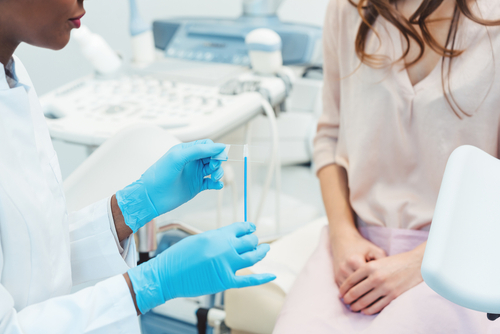
Nearly one in five people in the United States have an STD. Sexually transmitted diseases, STDs, are diseases passed from one person to another through sexual contact. HIV, chlamydia, gonorrhea, syphilis, HPV, and herpes are common diseases detected by regular STD testing.
STDs can significantly affect your life, resulting in infertility, discomfort, and even death. Let’s take a look at major STD symptoms to look out for.
What Are Some Common STD Symptoms?
The most obvious way to determine if you have an STI or STD is through uncomfortable and noticeable symptoms. The most common symptoms are:
- Pain in the genitals
- Skin rash
- Sore throat
- Discolored discharge from the penis or vagina
- Frequent urination
- Fever
However, not all STDs show symptoms, which can be highly misleading and give a false sense of health. In actuality, asymptomatic STDs are more common than symptomatic STDs.
When Should I Get Tested?
There are a few factors that determine when you should get tested, which could be often.
It's essential to undergo STD testing if you have new or multiple sex partners. If you're at risk for infection or if your sexual partner has an existing STD, it’s recommended to get tested on a regular basis.
“Sexually transmitted diseases are more common than we think, and not all infections, such as HPV, show symptoms,” says Dr. Daniela Accurso, a family medicine physician at Summit Health.
“That’s why it is crucial for your long-term health to get screened if you are at risk. This starts with an open and honest conversation with your medical provider and getting the care you deserve. Everyone should have comprehensive and accessible treatment for STDs, and testing as early as possible makes all the difference in keeping you safe and healthy.”
STD Testing
If you're hesitant about STD screenings and tests, don't be. Testing for disease and infection is simple.. While some tests may take longer to get results, some STD screenings can yield results on the spot.
Some different ways to test for STDs are:
- Blood tests
- Urine samples
- Genital swab
- Discharge or sore swab
The Severity of HPV
HPV, or the human papillomavirus, is a common STD that can wreak havoc on someone's system by manifesting different cancers. HPV can develop into cancers like:
- Oral
- Penile
- Cervical
- Vulvar
- Rectal
The most prevalent strains of the human papillomavirus, HPV 16 and HPV 18, are responsible for many cancers. HPV can dissipate on its own, but it takes time and leaves the body at risk for cancer. Unfortunately, it's tough to determine if HPV strains will manifest as serious diseases later on in life.
In 2020, the number of HPV-attributable cancers was well over 45,000.
HPV Testing
The simple way of detecting HPV is through the HPV test, which is identical to a pap test. Pap (Papanicolaou) tests collect cervix cells to determine if there is any presence of HPV.
HIV Testing
One of the most notorious STDs, the human immunodeficiency virus, or HIV, is the virus that eventually leads to AIDS (acquired immunodeficiency syndrome).
The transmission of HIV primarily occurs through bodily fluids like semen and blood. While mainly spread through sexual contact, it can spread via unclean needles. Ryan White, a 13-year-old boy with hemophilia, developed HIV/AIDS from a blood transfusion.
HIV can damage the immune system, opening the body up for even more deadly infections. In particular, HIV damages CD4 cells, which allow your immune system to fight off disease.
The transmission of HIV can also occur during pregnancy. When the mother has HIV, the infection can spread to the placenta, then the fetus. The mother could also pass the disease through the labor process.
Luckily, people with HIV have a much more significant chance of living a comfortable and long life with it, thanks to successful treatments and anti-HIV drugs. However, there is currently no cure.
Methods of testing for HIV vary, and there are three main types.
- Antibody Test - An antibody test essentially determines if you have had a past infection with a disease. The HIV antibody test aims to detect the virus within your blood.
- Antibody/Antigen Test - Antigens are toxins or other things that trigger the immune response. While looking for both evidence of past infection and foreign substance in the body (notably the antigen p24), a doctor can determine, within about a month, if you have HIV.
- NATs - A more uncommon test, the nucleic acid test (NAT), looks for the virus directly in the blood. It’s much more expensive than the standard antibody test. It’s usually used in specific scenarios. The nucleic acid test is also helpful in spotting hepatitis C.
How to Prevent STDs
- Although testing for infections and diseases is a good idea, you can always be more careful to lessen infection chances, including: Vaccination - STD vaccinations are available for multiple infections and diseases. Possibly the most notable example, the HPV vaccine, is a safe and effective method to prevent cancer throughout your lifetime. It's never too early to take the HPV vaccine, and the CDC recommends getting multiple doses before the age of 15.
- Abstinence from Sex - The easiest and most effective way to avoid disease is by not having sex in the first place.
- Condom Use - By using male condoms, the STD spread rate goes down considerably. While the latex condom is most common, some may have allergic reactions and opt for non-latex condoms.
Final Thoughts on STD Testing
With regular STD testing and monitoring potential symptoms, you can prevent detrimental effects like infertility and even save your life.
At Summit Health’s CityMD urgent care locations, we offer fast walk-in STD testing for HIV and other sexually transmitted diseases (STDs) in a safe, comfortable environment. We provide immediate, fast, and comprehensive STD testing and treatment, walk into a CityMD near you.
